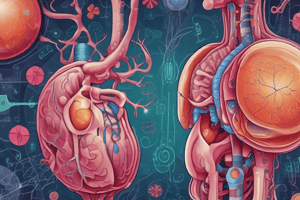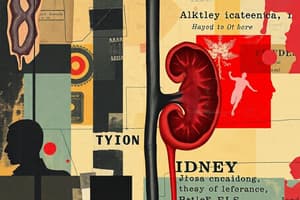Podcast
Questions and Answers
What is a primary function of the kidneys in the human body?
What is a primary function of the kidneys in the human body?
Which part of the nephron is primarily responsible for the filtration of blood?
Which part of the nephron is primarily responsible for the filtration of blood?
What is a common cause of renal calculi?
What is a common cause of renal calculi?
Which symptom is NOT typically associated with a urinary tract infection (UTI)?
Which symptom is NOT typically associated with a urinary tract infection (UTI)?
What is a potential pharmacological treatment for acute glomerulonephritis?
What is a potential pharmacological treatment for acute glomerulonephritis?
Which function is NOT performed by the kidneys?
Which function is NOT performed by the kidneys?
What type of ions are primarily responsible for the formation of most renal calculi?
What type of ions are primarily responsible for the formation of most renal calculi?
Which statement about the nephron's function is accurate?
Which statement about the nephron's function is accurate?
Which of the following substances is NOT mentioned as a component that can form urinary calculi?
Which of the following substances is NOT mentioned as a component that can form urinary calculi?
What role do kidneys play in the regulation of blood pressure?
What role do kidneys play in the regulation of blood pressure?
What symptom is most commonly associated with a stone lodged in the bladder?
What symptom is most commonly associated with a stone lodged in the bladder?
What imaging technique is occasionally beneficial for diagnosing renal calculi?
What imaging technique is occasionally beneficial for diagnosing renal calculi?
Which of the following factors are NOT typically measured in a blood test for assessing renal function related to stone formation?
Which of the following factors are NOT typically measured in a blood test for assessing renal function related to stone formation?
What is a common procedure for crushing a kidney stone?
What is a common procedure for crushing a kidney stone?
How can acute renal colic be effectively managed at home?
How can acute renal colic be effectively managed at home?
What is the primary reason for straining the urine after an acute kidney stone event?
What is the primary reason for straining the urine after an acute kidney stone event?
Which symptom is least likely to occur during a kidney stone obstruction?
Which symptom is least likely to occur during a kidney stone obstruction?
What therapeutic approach may be used to enhance the passage of a kidney stone?
What therapeutic approach may be used to enhance the passage of a kidney stone?
Which test provides useful information about calcium levels related to stone formation?
Which test provides useful information about calcium levels related to stone formation?
What renal function test is NOT typically assessed via blood tests concerning kidney stones?
What renal function test is NOT typically assessed via blood tests concerning kidney stones?
Which of the following medications may have its clinical effect enhanced by hyperthyroidism treatment?
Which of the following medications may have its clinical effect enhanced by hyperthyroidism treatment?
What is the recommended timing for taking thyroid replacement therapy?
What is the recommended timing for taking thyroid replacement therapy?
Which of the following is NOT a typical nursing consideration for patients undergoing thyroid replacement therapy?
Which of the following is NOT a typical nursing consideration for patients undergoing thyroid replacement therapy?
What impact may hyperthyroidism have on oral diabetic agents?
What impact may hyperthyroidism have on oral diabetic agents?
Among these interactions, which is a cautionary note regarding NSAIDs and corticosteroids with hyperthyroidism treatment?
Among these interactions, which is a cautionary note regarding NSAIDs and corticosteroids with hyperthyroidism treatment?
Why is it necessary for patients on thyroid replacement therapy to monitor their thyroid function regularly?
Why is it necessary for patients on thyroid replacement therapy to monitor their thyroid function regularly?
Which condition is primarily responsible for the autoimmune damage to the thyroid gland in hypothyroidism?
Which condition is primarily responsible for the autoimmune damage to the thyroid gland in hypothyroidism?
What is a common symptom of severe hypothyroidism that may occur in advanced stages?
What is a common symptom of severe hypothyroidism that may occur in advanced stages?
Which of the following symptoms is NOT typically associated with hypothyroidism?
Which of the following symptoms is NOT typically associated with hypothyroidism?
Which factor contributes to central hypothyroidism?
Which factor contributes to central hypothyroidism?
In advanced cases of hypothyroidism, which cognitive issue may arise and resemble dementia?
In advanced cases of hypothyroidism, which cognitive issue may arise and resemble dementia?
Which of the following symptoms may indicate a slowed thought process due to hypothyroidism?
Which of the following symptoms may indicate a slowed thought process due to hypothyroidism?
What skin change is commonly seen in individuals with hypothyroidism?
What skin change is commonly seen in individuals with hypothyroidism?
Which of the following complications could arise from severe hypothyroidism?
Which of the following complications could arise from severe hypothyroidism?
What is a potential issue related to the nails in a person suffering from hypothyroidism?
What is a potential issue related to the nails in a person suffering from hypothyroidism?
Which symptom is directly linked to the decreased metabolic rate due to low thyroid hormone (TH)?
Which symptom is directly linked to the decreased metabolic rate due to low thyroid hormone (TH)?
What is the main goal of titrating levothyroxine dosage in elderly patients?
What is the main goal of titrating levothyroxine dosage in elderly patients?
Which of the following best describes the general action of thyroid hormone medication like levothyroxine?
Which of the following best describes the general action of thyroid hormone medication like levothyroxine?
Which side effect is commonly associated with the overdosage of thyroid hormone medication?
Which side effect is commonly associated with the overdosage of thyroid hormone medication?
In the context of hypothyroidism, which of the following statements regarding weight gain is true?
In the context of hypothyroidism, which of the following statements regarding weight gain is true?
How does levothyroxine function in the treatment of thyroid hormone deficiency?
How does levothyroxine function in the treatment of thyroid hormone deficiency?
Which of the following is NOT a typical symptom of hypothyroidism?
Which of the following is NOT a typical symptom of hypothyroidism?
What approach is essential when adjusting dosages of thyroid medication for efficiency?
What approach is essential when adjusting dosages of thyroid medication for efficiency?
What is a common reason for increased sensitivity to levothyroxine in elderly patients?
What is a common reason for increased sensitivity to levothyroxine in elderly patients?
Flashcards are hidden until you start studying
Study Notes
Introduction
- The kidneys are responsible for removing waste products from the body, removing drugs from the body, balancing body fluids, releasing hormones that regulate blood pressure, producing an active form of vitamin D, controlling the production of red blood cells, and regulating the acid-base balance.
- The nephron is the functional unit of the kidney.
Renal Calculi
- Renal calculi (kidney stones) form when ions precipitate from solutions in the urine.
- The most common type of kidney stone is calcium oxalate.
- Other types include calcium phosphate, calcium urate, uric acid crystals, cystine, and struvite.
- Kidney stones can cause pain, nausea, vomiting, diarrhoea, and abdominal discomfort.
- Kidney stones may also cause urinary retention if they obstruct the neck of the bladder.
- Diagnosis is made using imaging such as KUB X-rays, CT, and US.
- Blood tests and 24-hour urine tests can help to determine the cause of kidney stones.
- Treatment usually involves encouraging fluid intake and pain management.
- Stones may pass spontaneously or may require surgical removal.
- A lithotripsy can be used to crush a stone.
- A ureteral stent may be inserted to maintain patency.
Urinary Tract Infection (UTI)
- UTIs are usually caused by the patient's own bowel flora.
- Bacteria from faeces enter the urinary tract at the urethral opening and ascend to the bladder and sometimes the kidneys.
- UTIs are the 10th leading cause of death in Australia.
- Symptoms of a UTI can include frequent urination, dysuria, suprapubic pain, turbid urine, foul-smelling urine, fever, non-specific back pain, loin pain, rigors, nausea, and vomiting.
- Confusion may be the only symptom in elderly patients.
- Amoxicillin is a penicillin antibiotic and commonly used to treat UTIs alongside Ceftriaxone, which is a third-generation cephalosporin.
Glomerulonephritis (Nephritic Syndrome)
- Glomerulonephritis is an inflammation of the glomerulus.
- It’s caused by primary glomerular injury, perpetuated by immunologic responses, drugs, toxins, and infections.
- Immune mechanisms and inflammation are major causes of glomerulonephritis.
- Immune injury can be caused by the deposition of circulating antigen-antibody immune complexes on the glomerulus, antibodies reacting against antigens within the glomerulus, and the action of antibodies directed against the capillary walls.
Hypothyroidism
- Hypothyroidism can result from an autoimmune disorder like Hashimoto's disease or primary thyroidal hypothyroidism caused by a dysfunction in the thyroid gland.
- Central hypothyroidism arises from failure of the pituitary or hypothalamus glands.
- Hashimoto's disease is characterized by the immune system attacking the thyroid gland, hindering its hormone production.
Symptoms of Hypothyroidism
- Fatigue
- Hair loss
- Fragile and brittle nails
- Numbness and tingling in fingers
- Hoarse voice
- Menstrual disturbances (menorrhagia or amenorrhea) for females
- Loss of libido
- Lowered body temperature and pulse rate
- Weight gain without increased food intake
- Thickened skin
- Thinning hair and hair loss
- Mask-like facial expression
- Cold intolerance
- Constipation
- Slowed thought processes and speech
- Tongue enlargement
- Increased hand and foot size
- Deafness
- Personality and cognitive changes resembling dementia
- Inadequate ventilation and sleep apnea
- Pleural effusion and respiratory muscle weakness
Hypothyroidism Progression
- The absence of thyroid hormones (TH) reduces the metabolic rate.
Connections between Hypothyroidism Symptoms and TH Deficiency
- Cold intolerance: Decreased metabolic rate, lowering body temperature.
- Bradycardia: Reduced heart rate due to decreased metabolic activity.
- Weight gain: Decreased metabolic rate hinders calorie burning.
- Depression: The exact mechanism is unclear, but it might be linked to hormonal imbalances or neurotransmitter alterations.
- Fatigue: Decreased metabolic rate, leading to reduced energy production.
Treatment for Hypothyroidism
- Replacement Therapy: Thyroid hormone replacement with synthetic levothyroxine.
- Levothyroxine: An oral preparation that's safe, stable, and affordable.
- Dosage: Elderly patients starting on levothyroxine are sensitive and experience more adverse reactions, so start with a low dose and increase slowly.
- Clinical Response: Evaluating and adjusting dosages based on clinical responses is crucial, and educating patients about side effects is key.
- Pharmacological Action: Levothyroxine is a thyroid hormone medication that acts slowly with a long duration of action and a half-life of 6-7 days.
- Uses: Treatment of thyroid hormone deficiency (hypothyroidism) and TSH-responsive thyroid tumors.
- Side Effects: Primarily related to overdosage and include nervousness, tremors, sweating, flushing, headaches, poor concentration, tachypnea, tachycardia, palpitations, muscle cramps, vomiting, and diarrhea – resembling hyperthyroidism symptoms.
- Drug Interactions: Levothyroxine can enhance the effects of warfarin, reduce the effects of digoxin, and affect the response to oral diabetic agents. Caution is advised when used with lithium, NSAIDs, and corticosteroids.
- Nursing Considerations: Patients should be informed that therapy takes weeks to become effective, the medication must be taken on an empty stomach as a single daily dose, ideally at the same time. It's a lifelong therapy and can interact with other medications. Thyroid function tests should be monitored regularly, and patients should report any signs of overdose.
Hypothyroidism and Hashimoto's Thyroiditis
- A video is available that provides additional information on hypothyroidism and Hashimoto's thyroiditis.
Studying That Suits You
Use AI to generate personalized quizzes and flashcards to suit your learning preferences.




